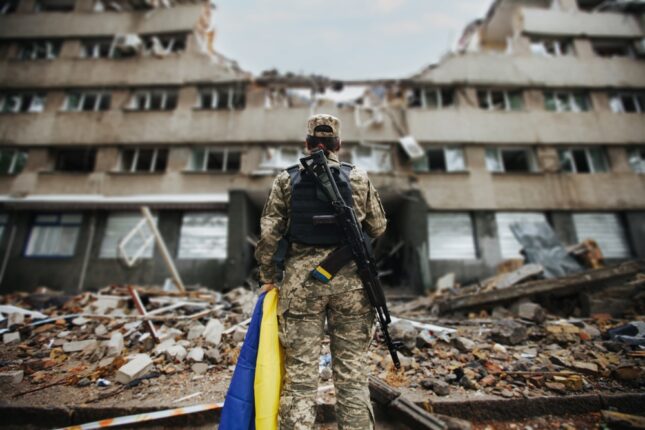-
Women and Children in Ukraine: Q&A with Kira Rudik
March 27, 2024 By Sarah B. Barnes
This month marked the two-year anniversary of the Russian invasion of Ukraine. March, in the United States, is Women’s History Month and internationally, the world celebrates International Women’s Day, each year on March 8. In recognition of both the ongoing war and its effects on Ukrainian women and children, the Maternal Health Initiative reached out to Member of Parliament and Leader of the Holos Party, Kira Rudik as a follow up to conversations we had at the start of the war and at its one year anniversary.
Ms. Rudik is a tireless advocate for her country and her people. In a recent Wilson Center NOW episode, she speaks about the recent bombing of her own apartment building, the remaining need for support from allies, the current status on the front lines, and the resilience of the Ukrainian people.
We followed up with Ms. Rudik after listening to this interview to invite her to speak more on the status of women and children in Ukraine and what she feels are some long-term impacts of the war on the Ukrainian people.
Maternal Health Initiative (MHI): Can you give us an update two years into the current conflict, what is the status of women in Ukraine regarding maternal and reproductive health, gender-based violence, and their role in war efforts?
Kira Rudik (KR): In Ukraine, we have the luxury of democracy which allows women to choose the best way to serve the nation and make victory closer. So as of right now, we have more than 45,000 women serving in the armed forces of Ukraine, and we are so proud of this number. However, women are also heavily involved as volunteers and working on the humanitarian logistics and other areas and are being very successful and effective in that because they have a choice. And most of these efforts they have made because they wanted to.
As for gender-based violence, there have been confirmed cases of sexual violence that were committed by Russian soldiers. And most of all, it breaks our hearts to talk about the 19,000 kidnapped children that have been confirmed by an international criminal court. And this is why the order for Putin’s arrest has been issued. Can you imagine the pain of at least 19,000 families who have lost their kids while they are still living in Ukraine with no actual way of getting their children back?
MHI: Can you speak to women refugees living outside the Ukraine and those internally displaced? How are they being supported in their healthcare needs?
KR: As of right now, we calculate there are around 8 million displaced persons and refugees inside and outside of Ukraine. They are mostly women and young children. In Ukraine, we have better control of the health care that displaced people are able to get. And outside Ukraine, we can only rely on our allies to provide our refugees with the universal health care that they need. Of course, it is an incredible economic hardship for both Ukrainian society and the society of our allies. But we are grateful that everybody is doing the best that they can.
MHI: You spoke some in your recent NOW interview on children’s education in Ukraine. Can you speak more to how children are being educated and if families are returning to schools in Ukraine?
KR: We have right now a situation in Ukraine where you have no guarantee that you will wake up in the morning when you go to bed at night. This happens because Russia attacks us, not only at the front line but also attacks the peaceful cities, schools, kindergartens, hospitals, everywhere in Kyiv, Lviv, Zaporizhzhia, Kharkiv, and Odesa. This is why it is critical that kids who are going to school are protected and have a bomb shelter at school. There are Ukrainian schools that never reopened because they do not have a shelter. So, kids are studying in the subways or in made-up bomb shelters. And of course, it is having a huge impact on the quality of the education process.
We are doing our best to renew the process and to move children from online to in person education. But this process needs to go hand in hand with ensuring their security. The best way to ensure the security of the educational process is by giving Ukraine the air defense systems that we need so we can protect kids and not have to send them to the bomb shelters over and over.
MHI: What do you see as some long-term impacts of this war on Ukrainian women and young children?
KR: As for the long-term impact, it is a massive tragedy for our country. Most of the refugees are women and children, and some of them have made the decision to never come back. We have lost so many people at the front lines and in the peaceful cities. And the ones who are living are living under a constant level of stress.
20 Days in Mariupol has won the 2024 Oscar for best documentary and from that you have seen the direct missile attack on the Maternity Ward. And these are the things that are constantly happening in different cities. So, you can imagine the level of terror and threat that we are all living under.
However, we also know about ourselves, that we are very resilient, and we have this kind of grit to push forward through all the troubles. So even while knowing all the issues and trying to tackle them, we are still very hopeful for our future.
Sources: Amnesty International, NPR, The Guardian.
Photo Credit: Ukrainian military woman with the Ukrainian flag in her hands on the background of an exploded house. Alim Yakubov/Shutterstock.com.
 A Publication of the Stimson Center.
A Publication of the Stimson Center.



